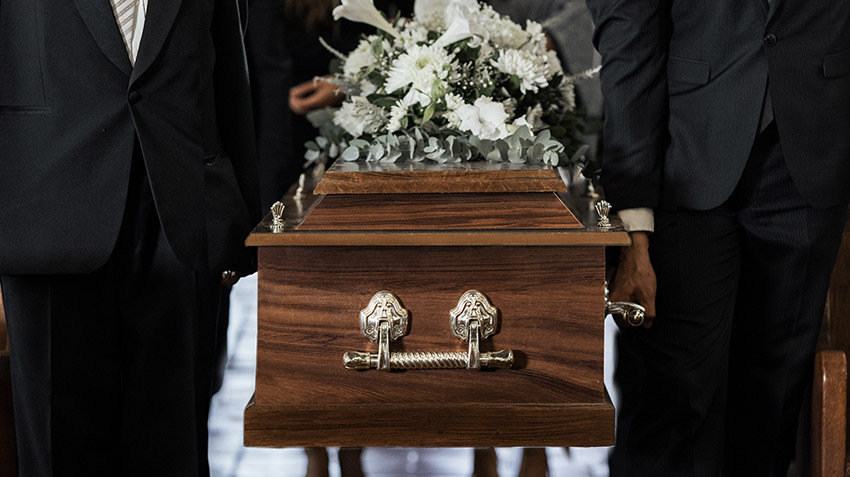
Losing a loved one is a very painful experience.
After the passing of a loved one, you and your family will need to plan how to lay them to rest, and this can be a difficult thing to do when you’re still coming to terms with your loss.
If your loved one hadn’t mentioned or written in their will how they would like their passing to be handled, you will need to look at the various types of funeral services and ceremonies to determine which path to take.
Remember, there is no right or wrong way to mourn. A funeral service can be used as a way to pay tribute to the life of your loved one, to help you deal with your loss, and to start the process of healing. Through a service that matches your views and honors your loved one in their memory, you can give your loved one a heartfelt final goodbye.
To help you decide how to move forward with your loved one’s funeral, here is a guide on the different types of funeral services and ceremonies.
Traditional Funerals
The traditional funeral is a familiar process that offers a safe space for mourning. It can be organized in a religious setting like a church or synagogue, or even at a funeral home’s chapel. Funerals may include a visitation or viewing of the deceased before the service, where the loved ones gather to pay their last respects.
1. The Ceremony
The religious leader usually leads the service by offering prayers, reading the scriptures, and speaking of mercy. Family members or close friends may provide eulogies, telling funny or touching stories and reminiscing about the deceased. Also, hymns or other religious music are usually part of the service.
2. The Committal
Having finished the service, the coffin is then transported to the cemetery for burial. A very short committal ceremony could be held at the grave site, giving mourners one last chance to say goodbye to their loved one.
Memorial Services
A memorial service is an adaptable format that can be changed to meet your and your family’s requirements. This may be a suitable option if your loved one’s body has been cremated and there’s no need for a viewing.
1. The Celebration of Life
These memorials can be held almost anywhere—a funeral home, a favorite park, or even your loved one’s former home. The format is more flexible and permits a larger gamut of ways to put love and remembrance into words.
Music, poetry, readings, and video tributes can all be used to celebrate the life of your loved one and offer comfort to you and your family.
2. Theme and Tone
Funerals can be individualized to represent the personality and preferences of your loved one. For example, your loved one’s hobby in life could be associated with the theme or the environment could be made to be lively and joyous.
Alternative Funerals
Among the many types of funeral services and ceremonies, there’s an emerging trend of non-traditional funerals and memorial services that are tailored to different faiths and to suit unique tastes.
1.Direct Cremation
This is a straightforward and low-priced option where the body is cremated without any ceremony. After the funeral, a memorial gathering or celebration of life can be held, or you and your family may opt for a private scattering of the cremated remains.
2. Natural Burials
This environment-friendly option employs biodegradable materials for the casket and shroud. The burial site can be marked as a conservation area so that the body may be allowed to return to the earth.
3. Home Funerals
For a more intimate service, you and your family may choose to organize a funeral service in the comfort of your own home. In this case, funeral homes can still serve as a source of advice and assistance regarding the legal and logistic aspects of the funeral.
Saying Goodbye to Your Loved one
There is no such thing as the “right way” to say goodbye. Consider these factors when making your decision:
- The wishes of the deceased: Were there any specific requests mentioned in a will or previous conversations before their passing?
- Religious beliefs: Usually, the religious beliefs of your loved one and their family may dictate how the funeral will be carried out.
- Family needs and preferences: What gives the most comfort and helps you and your family find peace?
- Financial considerations: The cost is determined by the complexity of the funeral arrangements.
How a Funeral Home can Help You
The funeral director is a skilled professional who can assist you with every facet of funeral planning. They can guide you on the options available to you, take you through the legalities, and make sure all arrangements are made with dignity and consideration.
Additionally, they may refer you for counseling with grief counselors or recommend you to support groups, providing you with the resources that allow you to come to terms with your loss and start healing.
Remember, there is no right or wrong way to mourn the loss of a loved one. A funeral service can be a way to pay tribute to the life of your loved one, to help you deal with your loss, and to start the process of healing. Through a service that matches your views and honors your loved one in their memory, it will be possible to create a deep and heartfelt farewell.
In addition to the services mentioned above, funeral homes can also assist with:
- Obituaries: Creating and publishing obituaries in the newspapers or online
- Music selection: Choosing the right music for the service
- Floral arrangements: Taking care of flower orders and setting them
- Transportation: Providing transportation for the deceased and the mourners
- Grief support: Giving referrals to grief counselors or support groups
Frequently Asked Questions
Below are some commonly asked questions about the different types of funeral services and ceremonies:
1. How long does a funeral service typically last?
A funeral service usually lasts for one hour but it can be longer or shorter based on the format.
2. What colors are appropriate for a funeral?
This depends on the religion and cultural traditions of the deceased and their family. Most Christian funerals have mourners wear black while other religions may see white as an appropriate color for funerals.
3. Are memorial services compulsory?
No, they’re not. But they offer a meaningful way to remember your loved one and come to terms with your loss.
Research the Different Types of Funeral Services
There are many ways to honor your loved one and lay them to rest and there is no one way to do it. Research the different types of funeral services and ceremonies and speak to a reliable professional funeral service provider to help you plan things out and take time to heal with your friends and family.



